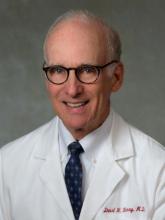How should oncologists be treating genitourinary malignancies during the COVID-19 pandemic? Aly-Khan A. Lalani, MD, of McMaster University in Hamilton, Ontario, and colleagues recently published recommendations that help answer that question (Can Urol Assoc J. 2020 May;14[5]:e154-8).
In this episode, Dr. Lalani reviews some of these recommendations with podcast host David H. Henry, MD, of Pennsylvania Hospital in Philadelphia. The pair discuss when and how to use androgen receptor axis-targeted therapies and radium-223 in metastatic prostate cancer, platinum-based chemotherapy in advanced urothelial carcinoma, and checkpoint inhibitors in patients with urothelial carcinoma or renal cell carcinoma.
* * *
Disclosures:
Dr. Henry reported having no financial disclosures relevant to this episode.
Dr. Lalani has relationships with Astellas Pharma, Bayer, Bristol-Myers Squibb, Merck, Novartis, Pfizer, Roche/Genentech, TerSera, AbbVie, Eisai, Ipsen, and Janssen.
* * *
For more MDedge Podcasts, go to mdedge.com/podcasts
Email the show: podcasts@mdedge.com
Interact with us on Twitter: @MDedgehemonc
David Henry on Twitter: @davidhenrymd
Ilana Yurkiewicz on Twitter: @ilanayurkiewicz

